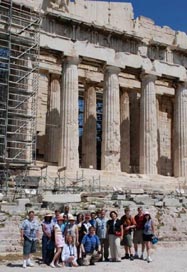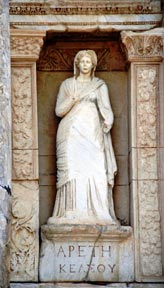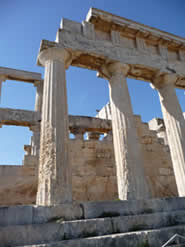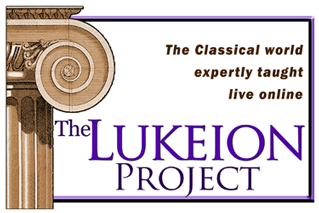Greek at The Lukeion Project

Read Greek instructor Regan Barr's answer to "Which Greek Should I Study"
"I would make them all learn English; and then I would let the clever ones learn Latin as an honour, and Greek as a treat." --Sir Winston Churchill
Why take Latin or Ancient Greek?
Learning Latin or Greek is well worth the effort. Studies conducted by the Educational Testing Service show that Latin students consistently outperform all other students on the verbal portion of the SAT based on data from the past decade.[1] Latin learners even outperform other language students by a fairly large margin. Classics majors tend to have a higher GPA at the college level and have accelerated performance in nearly all other subjects such as math, music and history. This makes them appealing as first choices for law and medical schools. While there are advantages to taking any language, Classical languages pay the highest dividends.
Why take Classical Languages at The Lukeion Project?
 There are many language products on the market targeting home educators. Most of these are designed for teachers who have little experience with a Classical language and no time to master one. While this sounds like an appealing feature the end result is often years of busy work with no appreciable gains in language skills. After hours of drills, chants and worksheets, many students have no idea how to use a dative, subjunctive or participle, much less how to translate real, undiluted Latin or Greek.Two or three years in these drill-type programs often provide learners no more than a scant couple of month’s head start over peers who have had no Latin at all. The very basic, simplified approach of Late Latin or koine Greek is highly attractive to those who are nervous about teaching a subject about which they know almost nothing. Many don't understand what is at risk. These highly simplified approaches to Latin or Greek will not pass muster on the National Latin Exam, the National Greek Exam, the AP Vergil Exam, or CLEP, nor will it suffice if a student wishes to pass directly into second year language at the college level. Success on these exams can mean improved admission rates to college, scholarships and hundreds of dollars saved by testing out of college language courses. All national and college exams are based on the Classical languages, not on later and medieval forms.
There are many language products on the market targeting home educators. Most of these are designed for teachers who have little experience with a Classical language and no time to master one. While this sounds like an appealing feature the end result is often years of busy work with no appreciable gains in language skills. After hours of drills, chants and worksheets, many students have no idea how to use a dative, subjunctive or participle, much less how to translate real, undiluted Latin or Greek.Two or three years in these drill-type programs often provide learners no more than a scant couple of month’s head start over peers who have had no Latin at all. The very basic, simplified approach of Late Latin or koine Greek is highly attractive to those who are nervous about teaching a subject about which they know almost nothing. Many don't understand what is at risk. These highly simplified approaches to Latin or Greek will not pass muster on the National Latin Exam, the National Greek Exam, the AP Vergil Exam, or CLEP, nor will it suffice if a student wishes to pass directly into second year language at the college level. Success on these exams can mean improved admission rates to college, scholarships and hundreds of dollars saved by testing out of college language courses. All national and college exams are based on the Classical languages, not on later and medieval forms.
High School Level Greek
 We offer 4 years of high-school level Greek. In Greek I, students use Athenaze: An Introduction to Ancient Greek, Book 1 by Balme and Lawall, 2nd edition (Oxford University Press, 2003). In Greek II, students will use book 2 by the same authors and publishers. This is a standard textbook used in college level Greek courses and the best available Greek program for students who want a well rounded Greek education. This text prepares students for reading Classical literature as well as later (koine) Greek of the New Testament. The textbook publishers have provided a rich selection of both Classical authors and New Testament passages in both levels of Greek.
We offer 4 years of high-school level Greek. In Greek I, students use Athenaze: An Introduction to Ancient Greek, Book 1 by Balme and Lawall, 2nd edition (Oxford University Press, 2003). In Greek II, students will use book 2 by the same authors and publishers. This is a standard textbook used in college level Greek courses and the best available Greek program for students who want a well rounded Greek education. This text prepares students for reading Classical literature as well as later (koine) Greek of the New Testament. The textbook publishers have provided a rich selection of both Classical authors and New Testament passages in both levels of Greek.
This Athenaze series is reading and grammar rich. These texts will give the student all the tools he or she needs to read real Greek and enter second year college Greek reading courses.
Our third and fourth year of Greek are surveys of authors. Third and fourth year Greek students will need a microphone as we begin to perfect pronunciation and in-class translation.
In all levels of Greek, our classes meet live once a week for an hour (16 weeks). In the first two years of Greek, students submit weekly translation assignments in which they are able to view the correct translations immediately after submitting their assignment. First and Second year students should also expect to view a recorded grammar overview each week prior to their live meeting. They will complete weekly graded quizzes online. Students, yes even gifted ones, should expect to dedicate around 8-12 hours per week to the study of Greek.
Our unique classroom environment is highly visual, interactive and engaging. Each session offers a fully illustrated explanation of the new material and review of older material. Our classroom allows each student to participate fully during class, ask questions about new material and respond during fun but competitive drills. Each Greek level has access to specially developed games that help students practice the material painlessly. Homework is credited and quiz translations are graded by the instructor.
To answer this question, we must begin by defining the terms:
“Classical Greek”
This refers to the Greek written and spoken from about 500 BC to 300 BC. While several dialects were spoken during this period, most programs teach “Attic” Greek (the dialect of Athens). This is the dialect of much of our early Greek literature, and it exercised the most influence over the Greek of subsequent periods. Classical Greek works include the histories of Herodotus and Thucydides, the enduring dramas of the playwrights Sophocles and Euripides, and the philosophy of Plato and Aristotle. Studying Classical Greek also prepares students to read later Greek, including that of the New Testament writings.
“Hellenistic Greek”
This is the next period in the development of the Greek language. It begins with the conquests of Alexander the Great in the late 4th century BC and runs to about 600 AD. The expansion of Alexander’s empire throughout the eastern Mediterranean had profound consequences for the development of the Greek language. His army absorbed soldiers who spoke several Greek dialects even as it expanded the size of the Greek-speaking world. Vast numbers of eastern peoples were soon speaking Greek as a second language. Within a few generations changes were felt throughout these far-flung territories: grammar was simplified, new foreign words crept in, pronunciation may have changed, and some Greek words evolved to include new meanings. The next two terms are both subsets of Hellenistic Greek.
“Koine Greek”
This is perhaps the most nebulous term, and the most misused. “Koine” means simply “common.” It’s a hard concept to define in detail, and its characteristics vary based on chronology and geography. In general terms, it refers to the most widely understood form of Hellenistic Greek; it’s the language of the “common” person, both written and spoken.
“Biblical Greek”
In contrast to the term “Koine,” this is the narrowest of the terms. The study of “Biblical Greek” concentrates on the vocabulary and grammatical constructions found in the New Testament while largely ignoring the rest of Greek literature. Strictly speaking, the terms “Koine Greek” and “Biblical Greek” are not synonymous; “Biblical Greek” is a subset of both “Hellenistic” and “Koine” Greek, in much the same way that the language of Shakespearean sonnets is a subset of the English language. The study of “Biblical Greek” does not prepare a student to read other great works of Classical Greek literature (like Herodotus, Euripides or Plato), and it doesn’t necessarily prepare the student for reading other Hellenistic or koine works (like the Septuagint or Plutarch).
At The Lukeion Project, we teach Classical (Attic) Greek. We believe that this provides the most balanced approach to Ancient Greek, and that all students will achieve their goals, whether those are to read Herodotus and Aristotle or the New Testament. We recognize that the New Testament contains some of the most influential documents ever written in ancient Greek, but we also believe that a student’s appreciation for them and for the uniqueness of their message will be heightened and informed by reading them within the context of the greater body of Greek literature.
Greek 1

First year Greek consists of two semester courses: Greek 1a & Greek 1b. Weekly quizzes and homework require students to develop and maintain good study habits. Please purchase Athenaze: An Introduction to Ancient Greek Book I
, 3rd edition (Oxford University Press, 2014). It is not necessary to purchase the companion workbook since the instructor provides plenty of online review games that serve the same purpose.
Please master the Greek alphabet prior to our first session of Greek 1a. We will offer a free session on learning the Greek alphabet in mid summer prioir to the start of the semester. Late registrants will be able to view a recording of this session.
A full year of Greek consists of two semesters (1a and 1b) but you may choose to register for 1a and 1b separately or both semesters at once. Two session times available (Students may not audit language classes):
Register for 2016-2017 classes
Greek 2
 Second year Greek consists of two semester courses: Greek 2a & 2b. Weekly quizzes and homework require students to develop and maintain good study habits. Please purchase Athenaze: An Introduction to Ancient Greek, Vol. 2
Second year Greek consists of two semester courses: Greek 2a & 2b. Weekly quizzes and homework require students to develop and maintain good study habits. Please purchase Athenaze: An Introduction to Ancient Greek, Vol. 2
by Balme and Lawall, 3rd edition (Oxford University Press, 2014). It is not necessary to purchase the companion workbook since the instructor provides plenty of online review games that serve the same purpose.
A full year of Greek consists of two semesters (2a & 2b) You may choose to register for 2a & 2b separately or both semesters at once. (Students may not audit language classes)
- Wednesdays at 10:15 am PM ET-- instructor R. Barr
Register for 2016-2017 classes
Greek 3
Third year Greek consists of two semester courses: Greek 3a and 3b
Third year is a survey of Greek authors. Students will translate 40-70 lines a week. During this two semester course, students will translate passages by a variety of authors, texts to be determined. Students will recite the Greek as well as the translation aloud in class (make sure your computer has a working microphone). Quizzes which include translation as well as questions about grammar, syntax and vocabulary, are assigned approximately every other week.
Please purchase A Greek Anthology (Reading Greek)
, J.A.C.T., Cambridge, 2009 (both semesters)
(2nd semester) D. Domingo-Foraste, Lysias on the Murder of Erathoshenes, Cane Press (try also www.canepress.org) for second semester.
Microphone Headset with mute
We offer one session time (please adjust for your time zone). (Students may not audit language classes)
- Wednesdays at 4 PM ET -- instructor R. Barr
Register for 2016-2017 classes
Greek 4
Fourth year Greek consists of two semester courses: Greek 4a and 4b
Greek 4 is a reading course for those who have finished the Greek 3a/b survey course and wish to improve their translation skills by reading extended unaltered passages from a single Greek author. Students prepare a translation of 60 - 100 lines each week. The author may be Plato, Xenophon, Thucydides, or other well-known Greek author. Students must be prepared to present their translations in class and discuss the grammar and syntax of each passage. Students will take quizzes on vocabulary, grammar, syntax and comprehension of our weekly translations. Computer microphone required. Contact instructor for course text requirement.
Microphone Headset with mute
Please purchase:
Greek 4a: P. A. Miller and C. Platter, eds.,Plato's Apology of Socrates: A Commentary, U. Okla. Press, 2010.
Greek 4b: M. W. Mather and J. W. Hewitt, eds, Xenophon's Anabasis Books I-IV, U. of Okla Press, 1962
We offer one session time (please adjust for your time zone). (Students may not audit language classes)
- Thursdays at 11:30 am ET -- instructor R. Barr
Register for 2016-2017 classes

